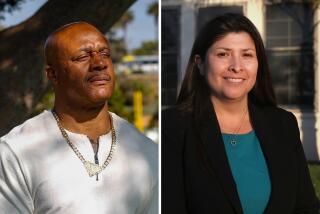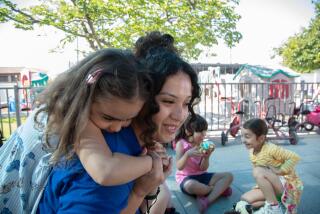Parent Volunteers Take Class, Then Bingo! : Fund raising: Parents helping out school programs learn to call the game correctly.
- Share via
LONG BEACH — The parent volunteers thought it would be as simple as 1-2-3. After all, how hard could it be to call out numbers for a bingo game? But they soon learned that there is a science to it--and you can’t afford to mess up.
“A bad caller will make the game miserable,” bingo expert David Gingrich said. “A bad caller will close the game down.”
With that warning, Gingrich recently began a “bingo school” for booster club members from Millikan and Wilson high schools, which have turned to the games to help pay for sports equipment, band uniforms and academic programs. But to run the games, the parents had to first learn the many rules of bingo.
“The majority of them at the beginning don’t know how to spell ‘bingo,’ much less call bingo,” Gingrich said.
Volunteer Kathy Shoan said she had not played since she was a child: “I was wondering how they were going to get enough beans.”
Long gone are the days when beans marked numbers on a bingo card. Players now dot their cards with magic markers called daubers, which they also bang on the tables when the caller makes a mistake. It’s not a good idea to make a mistake.
“When you call B13, say B13 (first), then B one-three, not B one-three, then 13. Otherwise, they’re gonna throw something at you,” Gingrich half-jokingly admonished about 20 school boosters gathered at Millikan High one recent Saturday morning. “We’re here to have fun, but remember that for 80% of these people, this is business.”
Aware that many bingo players take the game seriously, some parents admitted they were a bit nervous. “I don’t want to come home with daubers all over me,” Shoan said.
Wilson High booster Doug Miller remained confident, however. “I’m a lawyer. I’m used to speaking, so it’s no big deal,” he said.
Gingrich, who owns a bingo supply company in Garden Grove, said a bingo caller who has the proper delivery and knows the game can increase attendance.
“There are callers who people follow,” Gingrich said. “Maybe they feel lucky with them, or maybe they like the caller’s continuity.”
Gingrich trained 40 volunteers to call bingo games at Lakewood, Millikan and Wilson high schools. Lakewood started its games last year, Millikan began its weekly sessions last Tuesday and Wilson starts its games Wednesday night.
The training emphasized a series of rules. “You are on a clock here. Once that thing goes beep, you need to get that second ball in there,” Gingrich told the parents, who were practicing on a stage with bingo equipment.
He explained how to pick up the ball with the bingo number, how to display it, how to place it before a camera so that it’s seen in the adjacent nonsmoking room, and how to call it.
Some parents were surprised by all the rules and the dozens of game variations, such as “triple bingo, outside corners OK” and “two card six pack.”
“I thought it would be more casual. It seems to be regimented,” said Wayne Pecjak, a Millikan booster.
Pecjak, who occasionally plays bingo himself, said the trick to being a good caller has “something to do with the voice. The way he calls the numbers. It shouldn’t be too hard, and it shouldn’t be too soft.”
Mary Kay Toumajian is staying away from bingo calling, saying she’s not “a caller kind of person.” But she was the force that helped organize bingo clubs at three of the five high schools in the Long Beach Unified School District.
Boosters at the two remaining high schools in the district, Poly and Jordan, said they too are working to pass out bingo cards at their campuses.
Lakewood High, which is in the district, earns about $2,900 each week. Millikan and Wilson boosters expect to raise considerably less--about $1,000 a week--because they will not have pull-tabs, a type of game that is banned in Long Beach.
“It’s a shame we have to do this to raise money for our kids, but it’s better than the candy sales and the bake sales and the carwashes,” Shoan said. “It’s better to do this than have kids go door to door, because it’s not safe anymore.”
A growing number of schools across Southern California are offering bingo games in school cafeterias, where parents once a week take turns calling out numbers and passing out popcorn.
“It helps our kids,” Toumajian said. “The schools need the money.”
Besides, it’s fun, some parents said. “I like being out there and calling out the numbers,” Pecjak said. “I don’t understand all the games yet. But I’ll learn.”
BACKGROUND
School booster clubs first proposed bingo games to help pay for extracurricular activities in the Lakewood and Long Beach high schools last year. But the proposal faced several stumbling blocks. Some parents argued that gambling would send the wrong message to children, school board members were not enthusiastic about the idea, and the city of Long Beach had a law that prevented the games in public buildings. The school board eventually approved the concept, and the Long Beach City Council last June changed its ordinance to allow the games.
More to Read
Sign up for Essential California
The most important California stories and recommendations in your inbox every morning.
You may occasionally receive promotional content from the Los Angeles Times.













